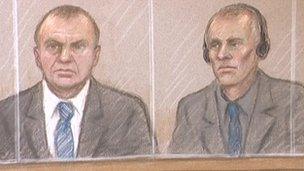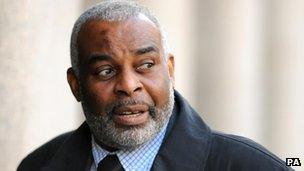Stephen Lawrence DNA 'found on defendants' clothes'
- Published

Gary Dobson (left) and David Norris both deny murdering Stephen Lawrence
Blood found on the jacket of a man accused of murdering Stephen Lawrence matched the black teenager's DNA, an Old Bailey jury has heard.
There was a billion-to-one chance the DNA from Gary Dobson's jacket was not the 18-year-old's, the court was told.
Mr Dobson, 36, and David Norris, 35, both of south London, deny murder.
The prosecution said the two defendants were part of a group that shouted a racist remark then attacked Stephen, in Eltham, south London, in 1993.
Mark Ellison QC, prosecuting, said a gang of five white youths forced the A-Level student to the ground at a bus stop then stabbed him twice, after his friend Duwayne Brooks managed to flee the scene.
'Swallowed up'
The jury of eight men and four women were handed a map of key landmarks and a brief chronology of the events of the night when Stephen was murdered.
Mr Ellison told them Stephen and his friend Mr Brooks were trying to get home when the gang crossed the road towards them.
One was heard to say "What, what nigger?", the court was told.
Mr Ellison said Mr Brooks managed to run away from the scene shouting "get up and run, Steve" - but Stephen could not escape.
"Stephen Lawrence did not manage to get away. The group quickly surrounded him," he said. "One witness described that he was swallowed up by the weight of numbers and forced to the ground."
He said the group had attacked "as one".
He also told the jury the case would be about textile fibres, and blood and hair on clothing that was seized from the defendants in 1993.
The new scientific evidence was discovered as part of a cold case review in 2007, he added, and that without this review, there would not be sufficient evidence to bring the men to court.
He also told the jury that Mr Lawrence's parents had brought a private prosecution over their son's death, but this collapsed in 1996 because "the evidence available was found to be wholly unreliable".
Mr Lawrence's parents, Doreen and Neville, were among those in court as the jury was sworn in.
During his opening statement, Mr Ellison said that a cold case scientific team had re-examined forensic "tapings" of Gary Dobson's jacket, looking for possible clothing fibre matches.
Scientists found 11 fibres that matched Stephen Lawrence's clothing, and one found on the collar appeared to include blood, he said.
This blood appeared to match Mr Lawrence's DNA, as did blood found in an evidence bag that originally held the jacket, Mr Ellison said.
The court also heard that two hairs were found in an evidence bag used to store Mr Norris's jeans, one of which was 2mm long and was found to match Mr Lawrence's DNA, and that this DNA profile was "assessed as being quite rare".
And a total of seven fibres were also found on Mr Norris's sweatshirt which potentially came from two items of Mr Lawrence's clothes, the jury was told.
Mr Ellison said the blood stain found on Mr Dobson's jacket would not have been detected in the 1990s because "the size was well below the minimal size capable of useful analysis".

Mr Lawrence, 69, left the court as the trial opened
Tim Roberts QC, who is defending Mr Dobson, then told the court that the charge against his client was based on unreliable evidence, and that there was contamination of evidence by the police.
He went on to say that Mr Dobson was at home with his parents at the time of the attack and that "he is innocent".
Mr Roberts added: "Our only concern is to protect an innocent man from injustice because clothing taken from his house was contaminated."
He also said one police officer involved in the case tampered with the evidence. The Crown, he added, is relying on evidence and fibres that "wouldn't fill a teaspoon".
Following Mr Roberts' statement Stephen Batten QC, who is defending Mr Norris, told the court that "we share the concerns about contamination".
Earlier, trial judge Mr Justice Treacy warned jurors to ignore last week's television series The Jury in which a juror scoured the internet before reaching a verdict.
"That was fiction, this is real life," he said.
On Monday he warned potential jurors not to discuss the case with "curious friends and family" and banned them from consulting the internet, so as not to jeopardise a fair trial.
He also described the trial as an important case with particular sensitivities, which had aroused strong feelings among many people.
The trial is expected to last until at least Christmas.